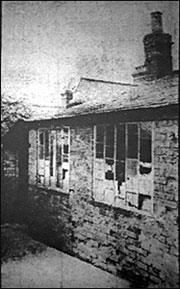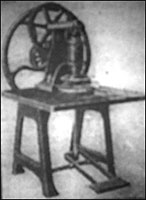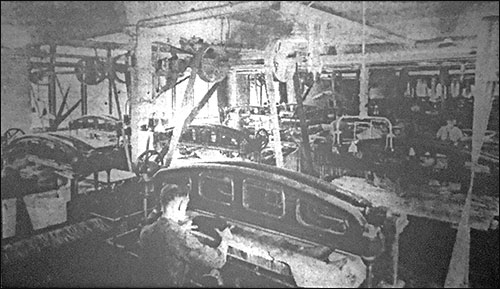Behind this week’s announcement that a Higham Ferrers and Rushden firm, Messrs. John White, Ltd., has set up an empire record by making considerably over 8,000,000 pairs of service footwear during the war, lies a business romance of exceptional interest.
It all centres around the ambitions and business genius of the man who founded Britain’s largest men’s boot manufacturing concern in a little back shop.
Born at Irthlingborough, Mr. John White became a boot clicker in the employ of Messrs. C. W. Horrell at Rushden. His keen mind was even then working out the possibilities of trading, and he had a ready talent for problems of costing.
Workshop Days
When he left Messrs. Horrell in 1918 and began to make boots in a little workshop at the back of his house in Crabb-street it was with no idea of dabbling on that scale for longer than he could help. System soon entered into the small enterprise, and hard work too – personal slogging for long hours.
 |
|
|
Where he began.....
|
|
|
 |
|
1945 method - in 1918 Mr White was himself cutting the soles on this small treadle press
|
|
Mr. White soon had a few assistants. One of these cut the soles on a treadle-operated press, but his attendance at the workshop was somewhat erratic, and the “boss” had often to take his place, sometimes working until past ten o’clock at night. It was “killing” work, but the machine played a great part in the prosperity of the “shop” and is preserved to this day as a treasured memento of that early toil.
It was presently apparent that a successful system of manufacture and trading had been devised, and in the first year or two there was a constant difficulty in coping with the growth of orders.
Various small premises were taken in succession, and with the occupation of a factory in Newton-road the business had definitely arrived. The boot industry as a whole encountered some lean years, and some old-established firms were breaking down, but work still multiplied at the factory in Newton-road. Popular gossip had it that men there were earning high wages. It was whispered that Mr. White was “a coming man” in the trade.
So it proved. Branch factories were opened. Cottages were removed for the extension of the main factory. Employees were numbered by the hundred.
At an early stage the piecework system was introduced as being satisfactory to the workers and giving high output for relatively low overhead costs. At the same time machinery, plant and working conditions were improved at every opportunity. As additional factories were acquired or new ones built, the most modern machines and systems were installed. Shafting and belts, for example, gave place to rows of electric motors, and the newest ideas in heating, lighting and rotation of work were used as a matter of course.
Over The Million
In 1934, when a limited company was formed, assets rose to a quarter of a million pounds, and 1,300 workers were turning out more than 1,500,000 pairs of footwear annually.
Because the Rushden site on which he might have extended was impeded, Mr. White had to look elsewhere when he wished to centralise his various offices, and thus it was that a handsome head office block, with large stock rooms, came to be established in Midland-road, Higham Ferrers – an unfortunate loss to Rushden, but a very welcome event in the old borough.
Rushden, however, gained the next plum, in the form of an ultramodern factory designed by an A.R.A., and representing what was then the last word in lay-out and equipment for the making of welted goods. In this same building the firm’s bottom-stock departments were centralised, with 40 or more heavy revolution presses thundering a daily salute to the little treadle machine of the Crabb-street era.
 |
Messrs John White’s modern pressroom, where over presses cut out bottom stock
|
Throughout all this expansion Mr. White retained personal control, still employing his skill in summing-up a costing sheet, still selecting his own key men, still thinking in terms of expansion and better working conditions. He continued to advocate piecework and the legalisation of industrial agreements, and was willing to pay “by results” without limit.
Advertising, both locally and nationally, for labour and for customers, was always conducted on bold lines. The company’s brands became household words, and just before the war nearly 2,000 employees were turning out about 3,000,000 pairs in a year. The firm had its own transport service, sports ground and canteen.
It was obvious that a chain of factories specialising in hard-wearing boots would play a large part in the war effort. The Duchess of Gloucester saw something of the vast and varied war production when she honoured the Rushden Lime-street factory with a visit last year, but it was not until Tuesday that the veil was lifted to some extent in the form of an announcement that over 8,000,000 pairs have been supplied to the order of the various Ministries – a record unequalled anywhere within the British Commonwealth.
Mr. White, though anxious to play his part in local affairs, has always been happier in his office or at home with his wife and daughters than in making public appearances, and it was not until the war that he threw aside a natural diffidence and took up fully the many opportunities that came his way for leadership.
He has been very liberal both to Rushden and Higham Ferrers. His Royal Silver Jubilee bandstand in the Hall Park at Rushden is one sign of his prosperity and good will. He has given a site and £10,000 for a new town hall at Higham Ferrers. He and his employees give the nation £5,000 for a Spitfire in 1940.
Mr. White has a fine library at his Rushden residence and delights in books of a visionary type. He supports art and music, the Red Cross and hospitals, National Savings and the domestic wartime campaigns such as holidays-at-home. He limits his travels because he prefers meals cooked by the Rushden-born lady who has been his partner since the time when he was just a clicker who dreamed of possibilities.
On Tuesday, for the first time in its history, the firm of John White, Ltd., held its annual meeting – and a luncheon – in London. At the Waldorf Hotel the founder told the story of his business to a special audience in which were represented the Boot Manufacturers’ Federation, the Footwear Control, the Ministry of Supply, financial houses, advertising agents, leather suppliers, bankers, customers and members of the company’s staff. The chief announcement – one of great importance to the firm and of general interest to the trade – was that the company will henceforth supply its goods direct to retailers. This will involve new ideas in distributive organisation, but the man who planned a back workshop in 1918 has already thought out his plans for 1945.
|